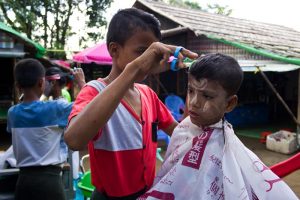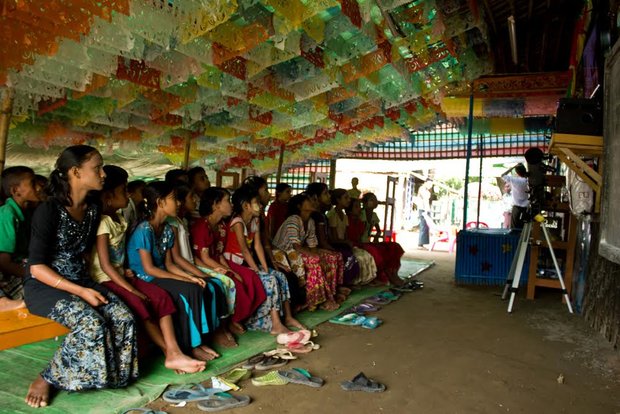Much of Bumay quarter, on the outskirts of Sittwe, is where Muslims have been confined since successive waves of communal violence hit the state in 2012. The quarter lies along the road that leads to Sittwe University, and every day the Muslim inhabitants see how dozens of Arakanese Buddhists routinely benefit from a chance at an education from which they have been excluded – another painful reminder of the strict segregation between the adherents of both religions imposed in the city three years ago.
Arakanese Buddhists rarely venture into Magyimyaing, the main sector in Bumay that is home to some 570 Muslim households, except to conduct some trade. Most of the inhabitants are Rohingya, but there are some Kaman Muslims too, who despite being recognised as citizens by the Burmese government, are subjected to largely to the same restrictions as their coreligionists.
[related]
Education and entertainment opportunities are almost completely absent for children in Magyimyaing. But this changed more than one year ago, when an outsider decided to launch an NGO called ‘Our Children’ to provide Rohingya children with a space where they can play, learn and enjoy some amenities like TV or computers that many children around the world take for granted – but are virtually unknown for most of the Rohingya children living in the ghettos, remote and isolated villages, and camps for internally displaced people throughout Arakan State.
This man is also the only Buddhist living permanently in the area. His name is Sai Han Htike – a 29-year-old ethnic Shan from Lashio who in July 2013 decided that he wanted to help Rohingya children.
“I am an orphan, I like children very much and I know what it means to belong to a persecuted minority, so when I heard about the plight of Rohingya people here I just wanted to help them,” he told DVB.
Thus, Sai Han Htike begun work with the help of some relatives and then managed to gather some money from donors in his town – Mandalay, Rangoon and other cities. He then moved to Sittwe to open his centre for children. He continues to receive donations from aid agencies in the former capital of Rangoon, and even from places abroad like Kuala Lumpur thanks to his links with interfaith organisations.
Staffed with a total of twenty local people, ‘Our Children’ is an open space located in a nondescript house in the main street of Bumay where children can enter almost at will. In a recent visit to the compound DVB saw dozens of children playing with toys their parents could
never dream to buy for them, watching cartoons on television, or playing videogames. The kids also receive lessons in Burmese or mathematics, get a haircut from volunteer apprentices, or even watch the stars at night with a donated telescope.

“At the beginning, the Muslim neighbours felt strange about me, but now they accept me. I am not scared to live among Muslims and the kids love me,” says Sai Han Htike.
Shofika, a Rohingya neighbour and mother of five and grandmother of eight, agrees with him. “He is a good man who takes care of our children very well. We are all happy to have him here doing what he’s doing for us,” she said. “Also, in Ramadan or Eid, he always provides meat for our celebrations,” she adds.
It is only when travelling through Sittwe’s Arakanese Buddhist areas that Sai Han Htike feels unsafe. “I try not to be more than one hour downtown for fear someone can recognise me and attack me. I always wear a helmet when I go by bike so nobody can see my face. I feel threatened there,” he explains.
He has also faced the incomprehension of the local authorities. “We are not a registered organisation, and the authorities came here to ask what I’m doing. I had to explain them about our activities very
patiently,” he says.
Sai Han Htike has faced many difficulties while running ‘Our Children’ from other quarters. According to him, the 969 movement spread propaganda in social media with the aim of discrediting him, and he claims that he has received veiled threats from Ma-Ba-Tha. Nevertheless, “we haven’t had any big problem so far,” he adds.
He dismiss movements like Ma-Ba-Tha as “just a political trick” and claims that his commitment to help Muslims in Arakan State stems from his Buddhist beliefs. “Buddha taught us that we have to help others, regardless of religion or race. We need to love each other despite the propaganda,” he explains.
“Everybody is talking about change now, so we need to change our attitude towards Muslims in this country. If we can’t accept the Rohingya as an ethnic group in Burma, at least we should accept them as human beings,” he concluded in an early morning as children started to enter the compound to play.



